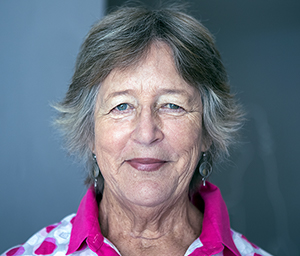Libby Lloyd
Question: How can we change social norms to prevent violence against women and girls (VAWG)?
“That is a big and difficult question. We have to work from many angles. We have to work through our community to get everyone engaged. We need to get our children and our men and women to understand respectful relationships. We need to be making sure that the services that we provide after the event are adequate. We need to be working with the laws to make sure that they are implemented. We need to develop new laws if it’s required or change laws to work better. We need to change the behaviour of perpetrators. But most of all, the thing we have to do is make sure that everything works together.”
Question: Could you share with us a success story on social norm change that has contributed to end VAWG?
“My answer might be quite similar to others. The one that I think of is the White Ribbon campaign in Australia. We got a movement established where men started to be given license to use their voice in the area of prevention of violence against women. Even more importantly than getting men involved in White Ribbon and it becoming a force on its own, the Commonwealth government recognised that we were making strides and engaged White Ribbon and others through a collaborate process to work with the government to develop a National Plan to Reduce Violence against Women, which is now a fully-fledged, well-resourced National Plan. So, now, from a sort of small seed, the momentum has built into really something quite significant that is going to make a big change in Australia over many, many years.”
Question: What would you suggest to policy-makers to advance ending VAWG?
“Be bold. The real difficulty in a very practical sense for governments at the minute is not to fully resource services after the event, but to really move their focus from after the event to stopping it from ever happening. So now we are really at a pivotal moment where we need to lift our focus from just services after the event to prevention.“
Question: Could you give me a call for action?
“A call for action is for everyone in the community, you, me, our next-door neighbour, and our friends, anyone we come across to get involved and see that they have a role in taking part.“
About the expert
Libby Lloyd
Position: Human Rights activist, who works closely with the Australian Commonwealth Government and a large number of NGOs
